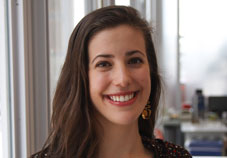
Project: Examining Civic Science Case Studies: Emily will create a comprehensive case study and ideas reservoir, highlighting and analyzing effective civic science engagement initiatives, showcasing the breadth of civic science work, and providing insight to enhance practices across diverse contexts.
Em is a Civic Science Associate based at Rockefeller University (RockEdu) in New York City. She completed her Ph.D. studying lung cancer biology at Sloan Kettering and has explored her interests in science communication all throughout graduate school, namely through her involvement in ComSciCon, running a science comedy show and podcast, journalistic and creative science writing, and volunteering with New York’s many wonderful science outreach organizations. Motivated by her biomedical science and science communication backgrounds, she’s especially interested in civic science surrounding ethics, accessibility, and disparities in clinical and genetics research and practice.
